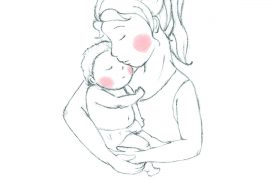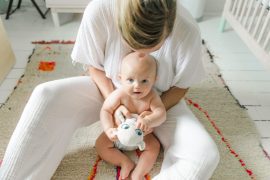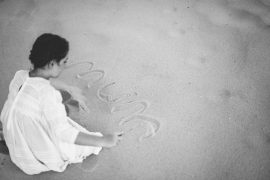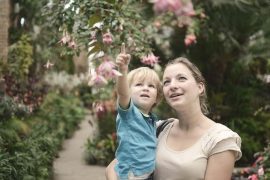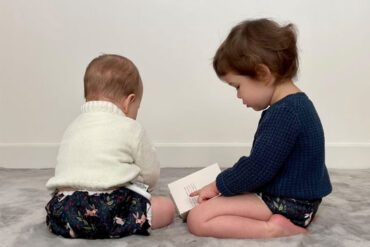If your child refuses to eat yoghurt with bits in it, you could try playing with sand in water, or adding sand to finger paint to play with so they can build up their experiences of the feeling of bits inside smooth texture through messy play, and slowly desensitising them to it.
If your child is under responding, they need support to increase their alertness through a mixture of deep pressure movement activities through the day, such as having a dance in Mummy’s arms, big cuddles, swinging, or jumping on a trampoline if they are older.
If your child is showing distress or pain in response to sensory experiences, your GP or family doctor can make a referral to your local child development team for further assessment. Or you can self-refer to a private occupational therapist who specialises in this area.
Fun ways to help your child’s sensory system develop and grow:
Give your child as many sensory experiences as you can, as early as possible. Allow them to be barefoot as often as possible, as our feet are a direct line to the brain and can receive so much sensory information, which is like pure gold to the developing brain. Allow them to splash in puddles and dig in the mud. Nature provides us with the richest sensory experiences and it’s often multi-sensory all at once, such as sound, touch, smell, sight, and taste too if we allow it!
Let them play with their food, exploring it with their hands, feet, and mouths as they want to.
The more they explore it with their hands, the more likely they are to put it in their mouths and eat it, and the stronger the neural pathways will grow in the process.
Let your child play with texture. Try a bowl of rice bubbles, a bowl of water and a spoon. Watch as they add water and delight in the crackle and pop of the rice bubbles. Slowly the texture will change as they play, from dry and crunchy to wet and soggy. They will be so busy playing they won’t worry about the change in texture and the feeling will become familiar and non-threatening, resulting in a higher tolerance for wet mushy foods later. Try it outside on the grass if you are worried about them making a big mess, the birds will love the clean up too!
Let your child have messy hands. Try not to be in a rush to wash their hands if they are not showing a desire to have them washed.
When there is mess on their hands while they play, the tactile sense is processing that information and becoming familiar with it. The more our hands get used to the sensations of wet, cold, hard, soft, warm and sticky in our early years, the more it is able to tune out the feeling of the hard pencil in their hand or the feeling of their desk under their arms. So when it’s time for learning handwriting later in life, this leaves space for their brain to focus on the teacher’s words and the lessons being taught.
Explore art galleries and museums where noise and light are often set up differently to our everyday environments. Take time to lie under a tree and watch the leaves dance in the wind. Play with echoes in underground carparks or tunnels, and have some old school fun with homemade “telephones” using two tins connected by string.
Massage – it’s never too late to start. Deep pressure through firm touch is calming to our sensory system.
Cuddles, hugs and back rubs all help feed and regulate the sensory system to help it process other incoming information.
It can help to apply some deep pressure through cuddles or jumping or massage just before trying new textured foods or other sensory experiences which are a challenge.
If your child is aged 0-6, Playcentre is a great place to go with your child to join other parents playing alongside their children in an environment where messy play and rich sensory experiences are part of the typical day.
Most importantly, get messy with them. Show them exploring texture is fun by sharing lots of fun encouraging faces and noises with them as they explore the world. Children are socially wired. They check in with the trusted adult around them often to see if what they are doing is safe or not, and when you’re having fun, they will have fun too.
Elen Nathan is an NZ registered Occupational Therapist at The Playful Place in Napier and a mum of 2 boys. She has over 15 years’ experience working with children and adults who have diverse needs. Elen has specialised in Autism Spectrum Disorder which has led her to work in peak body organisations including Autism New Zealand, The National Autistic Society (UK) and Autism Victoria (AUS)

